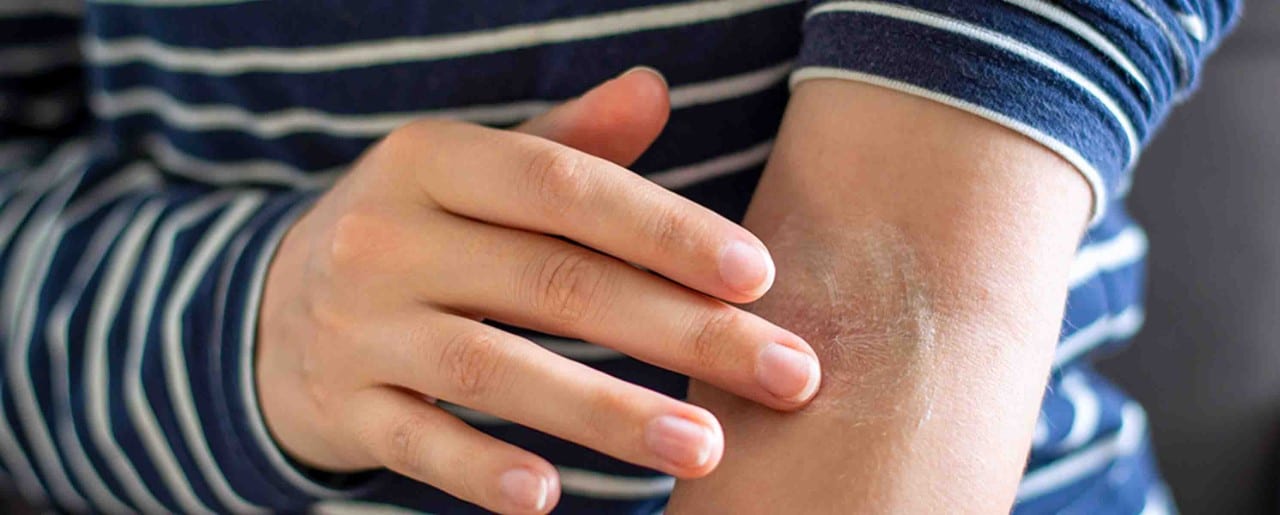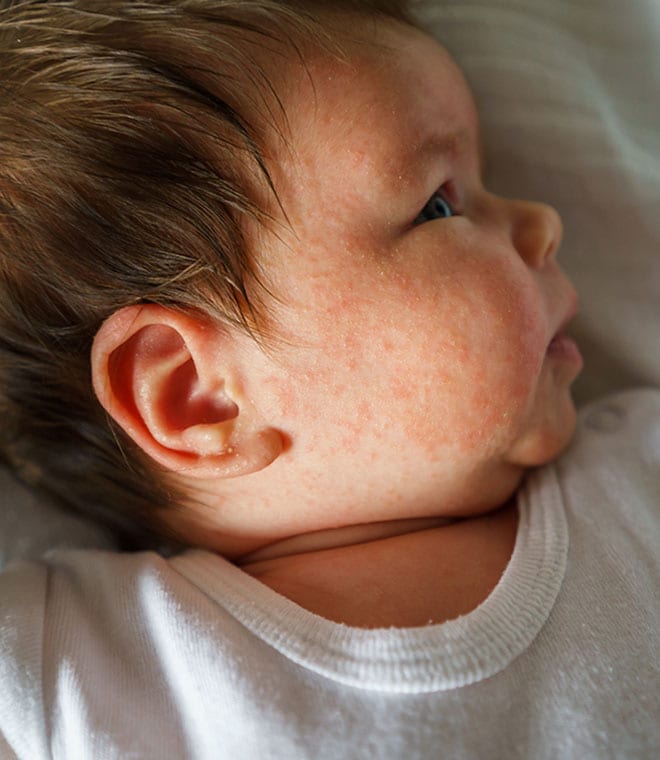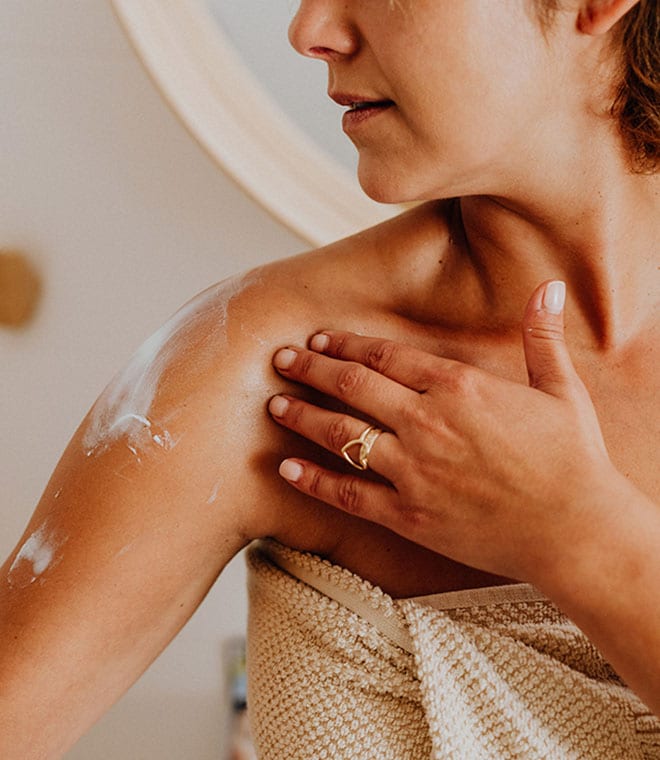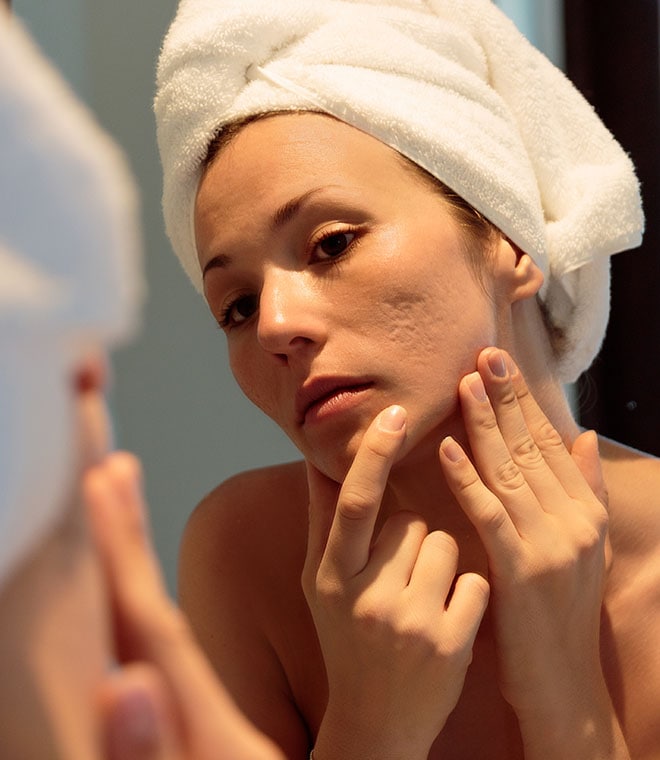Health
What are some creams and other treatments for eczema?
By Anna H. Chacon, MD, Fellow of the American Academy of Dermatology Aug 11, 2023 • 8 min
While there is no cure for eczema (atopic dermatitis), a treatment plan can help you manage this common skin condition. With proper care, you can ease symptoms of eczema when they arise and lower the likelihood of symptoms returning in the future. There are various treatments healthcare providers may recommend and prescribe for eczema.
Skin care and personal care products for eczema
Adopting a healthy skin care routine is an important part of eczema management. Healthcare providers may recommend use of the following:
- Moisturizer: Applying a moisturizer after you bathe and at other times during the day can help seal in moisture to keep skin better hydrated. Healthcare providers may advise people with eczema to look for moisturizers that contain ingredients like glycerin, coconut oil, aloe, hyaluronic acid, mineral oil and petrolatum. Thick creams and ointments may be preferred over lotions to help prevent dry skin. Additives such as essential oils and fragrance should be avoided.
- Body wash: Using a gentle, fragrance-free, moisturizing body wash that bears the National Eczema Association’s Seal of Acceptance can help you cleanse thoroughly with less risk of exposing your skin to harsh ingredients that may trigger eczema.
Healthcare providers may also suggest that people with eczema avoid using skin care products and tools that can irritate the skin, such as loofahs and body scrubs.
- Eczema bath soak: Limit your bath or shower time to five to 10 minutes, and use warm water. You can apply a moisturizer while your skin is still damp to help combat dry skin.
- Hair and scalp care: Scalp treatment for eczema depends on the type and cause of eczema. Shampoos for eczema are formulated to be gentle and are usually fragrance-free, reducing the likelihood of irritation. Using the cool setting on a hair dryer may also help prevent itchiness and dryness of the scalp.
Over-the-counter treatments for eczema
For mild eczema, over-the-counter eczema treatments combined with a modified skin care regimen may be enough to control symptoms. Although over-the-counter treatments don’t require a prescription, it’s important to talk with your healthcare provider before using products to address eczema.
Over-the-counter eczema treatments include:
- Topical hydrocortisone helps ease inflammation and itching associated with eczema. It works by interfering with the immune system’s inflammatory response. Most over-the-counter cream for eczema contains 1% hydrocortisone, which you can also find in the form of ointments, lotions and gels.
- Pain relievers may be appropriate for some people with eczema who experience pain, like stinging and burning. Over-the-counter pain relievers can help soothe discomfort. These include acetaminophen and nonsteroidal anti-inflammatory drugs (NSAIDs), like ibuprofen and naproxen.
Prescription eczema treatments include:
- Prescription eczema cream may be prescribed for moderate to severe eczema. The following are some examples of prescription atopic dermatitis medications that can be applied to your skin to help treat mild to moderate eczema:
- Topical steroids: Stronger corticosteroid creams and ointments are often prescribed for active symptoms of mild to moderate eczema. They’re generally only suitable for use for short periods because they can cause thinning of the skin. Healthcare providers may look for alternatives to corticosteroids to treat eczema in sensitive areas, such as the face, genitals and skin folds.
- Topical calcineurin inhibitors: Tacrolimus ointment and pimecrolimus cream are topical calcineurin inhibitors (TCIs), medications that prevent certain cells in the immune system from activating, which reduces itching, redness and other symptoms of eczema. These topical medications are generally safe to apply to more delicate areas of the body, like the eyelids and genitals.
- Topical PDE4 inhibitors: Crisaborole is another ointment that can be applied to many areas of the body to treat eczema. This drug is the only FDA-approved medication in the topical phosphodiesterase 4 (PDE4) inhibitor class. Inflammation associated with eczema happens partially due to an overproduction of immune system chemicals called cytokines. PDE4 inhibitors work by hindering the production of these inflammation-causing cytokines.
- Topical JAK inhibitor drugs like ruxolitinib 1.5% cream interfere with the activities of cytokines to reduce symptoms of eczema. Typically, Janus kinase (JAK) inhibitors are recommended only for people who can’t use other topical medications due to a weakened immune system and for those who didn’t get relief from other topicals.
Oral prescription medications for eczema
Prescription medications taken by mouth may be used in the treatment of moderate to severe eczema. These drugs include:
- Oral steroid medications may be taken for short periods of time to ease symptoms of eczema when flare-ups occur. Like topical steroids, they work by disrupting the inflammatory response.
- Immunosuppressants are drugs that suppress the activities of the immune system and were once commonly prescribed for eczema. These medications include azathioprine, cyclosporine, methotrexate and mycophenolate mofetil. While immunosuppressants can be effective at controlling eczema, they can increase risk of infections and cause other side effects. Healthcare providers typically recommend newer medications, although immunosuppressants may still be a treatment option for some individuals.
- JAK inhibitors such as abrocitinib and upadacitinib are approved for the treatment of eczema in individuals 12 and older. Healthcare providers typically prescribe these medications only after trying other interventions, such as topical steroid creams and injectable medications for eczema.
Other treatments for eczema
Additional treatments beyond prescription oral drugs and topical options are available for the management of moderate to severe eczema. These include:
- Biologics are injectable medications that block certain immune system messengers, called interleukins, to reduce inflammation. They include dupilumab, which is approved for adults and children 6 months and older, and tralokinumab, which is approved only for adults age 18 and older.
- Phototherapy, also called light therapy, involves exposing the skin to ultraviolet energy in a controlled environment. Healthcare providers most often recommend phototherapy for people who have widespread eczema and for those who haven’t responded to other treatments.
Explore your treatment options
From oral medications and eczema treatment creams to injections and other therapies, you have a range of options for treating your eczema. The best options depend on a variety of factors, including the type of eczema you have, the severity of your symptoms, your age and your health history. Talk to your healthcare provider about which treatments are right for you.
Updated August 2023.
Sources:
- https://familydoctor.org/antihistamines-understanding-your-otc-options/
- https://www.aad.org/public/diseases/eczema/types/atopic-dermatitis/treatment
- https://www.mayoclinic.org/diseases-conditions/atopic-dermatitis-eczema/symptoms-causes/syc-20353273
- https://my.clevelandclinic.org/health/diseases/9998-eczema
- https://nationaleczema.org/eczema/treatment/bathing/
- https://nationaleczema.org/eczema-products/?pg=1&ppg=6
- https://nationaleczema.org/eczema/treatment/
- https://nationaleczema.org/eczema/treatment/over-the-counter/
- https://www.aad.org/public/diseases/eczema/atopic-dermatitis-coping
- https://www.aad.org/public/diseases/eczema/childhood/triggers/friendly-products




